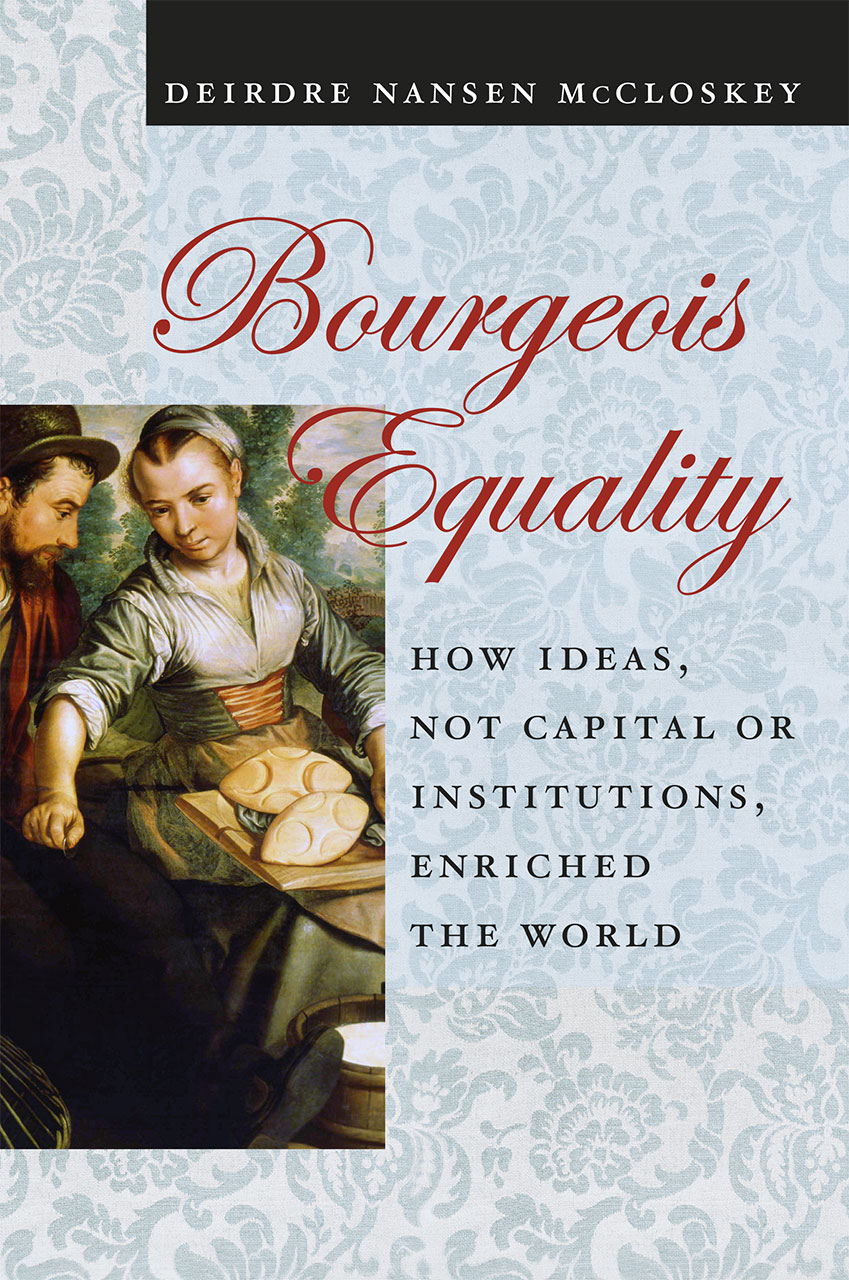Richard Godden: “Bourgeois Equality” by Deirdre McCloskey

The past 200 years have seen a huge increase in aggregate global wealth, which has benefited the vast majority of people around the world. Conservative estimates suggest that average real wages have increased ten-fold and the increase in wealth has probably been considerably greater than this (perhaps thirty-fold or even a hundred-fold). Why has this happened? Why are we now so rich? This is the fundamental question that Deirdre McCloskey seeks to address in Bourgeois Equality, the final volume in her trilogy relating to bourgeois values.
Those who have not read it may doubt that we needed yet another book about “the causes of the Industrial Revolution”. Those who have read it will disagree. Its scope is breath-taking: in which other book about economic development would you find 20 pages of analysis of the novels of Jane Austen, two chapters relating to the historical change in the meaning of the word “honest” and its equivalents in other languages, a discussion of the economic impact of post-millennialism and comments on subjects as diverse as the philosophy of the mind and the economics of the temple systems of the Ancient Middle East? McCloskey is Distinguished Professor of Economics, History, English and Communications at the University of Illinois in Chicago and her inter-disciplinary approach to her subject is anything but conventional.
She begins by attacking almost all of the widely accepted explanations of what she calls “The Great Enrichment”: trade and export lead growth (whether or not accompanied by political domination); the accumulation of capital; consumer lead demand; the scientific revolution; the growth in modern institutions; and much else. The role of some of these things is dismissed in summary terms, often with a quotable quote. Other factors (such as property rights, the accumulation of capital and trade) are recognised as being, to some extent at least, necessary for economic growth but dismissed on the ground that they are historically commonplace. As McCloskey puts it, “Oxygen is necessary for a fire but it would be at least unhelpful to explain the Chicago Fire of October 8-10, 1871 by the presence of oxygen in the earth’s atmosphere” (page (xiii)).
In place of the normal list of explanatory factors, McCloskey puts “ideas”. The book is subtitled, “How ideas, not capital or institutions enriched the world” and McCloskey asserts that the key thing that changed in the period leading up to the start of The Great Enrichment was “ideology” (page xxii). Her claim is “that the initiating change leading The Great Enrichment was in words” (page 235) and she spends hundreds of pages defending this thesis. She argues that aristocratic values were replaced by bourgeois values (“The new ethic was of betterment, novelty, risk taking, creativity, democracy, equality, liberty, dignity”, page 279) and this led to the wave of innovation that she calls, “trade-tested betterment”, which directly resulted in The Great Enrichment, first in the UK and then elsewhere.
So is McCloskey’s theory simply Max Weber revisited? Although, unsurprisingly, McCloskey dismisses Webber’s view of the role of anxiety caused by the doctrine of predestination, her approach is clearly related to that of Weber, probably more closely than she would admit. It is based on ideas rather than material causes and recognises the profound role of religion in the creation of the relevant ideas. However, there are important differences between Weber’s and McCloskey’s approaches including their opinions as to precisely which religious beliefs gave rise to the key ideas and the relationship between, on the one hand, these ideas and, on the other, psychology and sociology.
Speaking generally, it would be reasonable to assert that McCloskey believes that the crucial change between 1600 and 1800 was a cultural change. However, she vigorously objects to this characterisation of her view, saying that calling ideas “culture” is “the vague way people talk when they have not actually taken on board the exact and gigantic literature about ideas, rhetoric, ideology, ceremonies, metaphors, stories and the like since the Greeks or the Talmudists or the Sanskrit grammarians” (page 122). She also, and perhaps with more justification, is at pains to point out that she is not asserting that there was a psychological change but rather that there was a sociological change.
McCloskey writes passionately and this passion points to a key issue: deep down, this book is not about the causes of Industrial Revolution but about how we should behave today in order to ensure that The Great Enrichment does not stall. McCloskey says that she is an optimist but she is clearly worried that things could go badly wrong. As she puts it, “Modern politics is a four-way tug of war between liberalism in the sensible part of the elite, socialism in the rest of the elite, traditionalism in the peasantry, and populism in the proletariat” (page 136). She turns aside from her central thesis to attack the left’s focus on equality of outcomes (and specifically the Gini coefficient), the power of the state to secure economic betterment (which she contemptuously dismisses), the idea that mechanisation and betterment causes poverty rather than wealth, regulation in general and what she refers to as “well-intentioned but erroneous policies that make us feel helpful even when they in fact damage the people we intend to help” (page 73).
She reserves her most savage comments for what she calls “the clerisy”, a term that she uses to refer to academics and intellectuals who sneer at Bourgeois values and promote either socialism or, on the other side of the political spectrum, nostalgic paternalism or worse: “The liberty of the bourgeoisie to venture was matched by the liberty of the workers, when they got the vote, to adopt growth-killing regulations, with a socialist clerisy cheering them on. And the dignity of workers was overmatched by an arrogance amongst successful entrepreneurs and wealthy rentiers, with a fascist clerisy cheering them on. Such are the usual tensions of liberal democracy. And such are the often mischievous dogmas of the clerisy” (page 404).
A book written with such passion and having such a broad scope inevitably has its defects. McCloskey has a tendency to overstate things (e.g. her assertions regarding the ubiquity of the rule of law including, surprisingly, in the empire of Genghis Khan, page 111, cannot go unchallenged); many other academics could legitimately feel bruised by the strength of the language with which she attacks them; and the book is too long, the final 150 pages in particular containing much material that repeats earlier points. There are also less important issues: errors of fact (e.g. Rev John Newton was not a Quaker as it stated on page 306); ex-cathedra statements that many will dispute (e.g. “Ordinary Europeans in the Middle Ages were barely Christian”, page 333); and statements that will only be comprehensible to a minority of readers (e.g. the reference to Ian Botham hitting a six, page 126).
However, these defects should not put anyone off. The book is essential reading for those who want to broaden their perspective on the causes of our current prosperity and to consider possible solutions to current economic and societal issues in the light of the lessons of the past. McCloskey’s passion is justified by the importance for her subject for the modern world. The onus is now on those who disagree with her arguments to answer them and on those who agree with these arguments to refine them.
“Bourgeois Equality” by Deirdre McCloskey was published in 2016 by The University of Chicago Press (ISBN-13:978-0-26-52793-2). 650 pp.
 Richard Godden is a Lawyer and has been a Partner with Linklaters for over 25 years during which time he has advised on a wide range of transactions and issues in various parts of the world.
Richard Godden is a Lawyer and has been a Partner with Linklaters for over 25 years during which time he has advised on a wide range of transactions and issues in various parts of the world.
Richard’s experience includes his time as Secretary at the UK Takeover Panel and a secondment to Linklaters’ Hong Kong office. He also served as Global Head of Client Sectors, responsible for Linklaters’ industry sector groups, and was a member of the Global Executive Committee.
